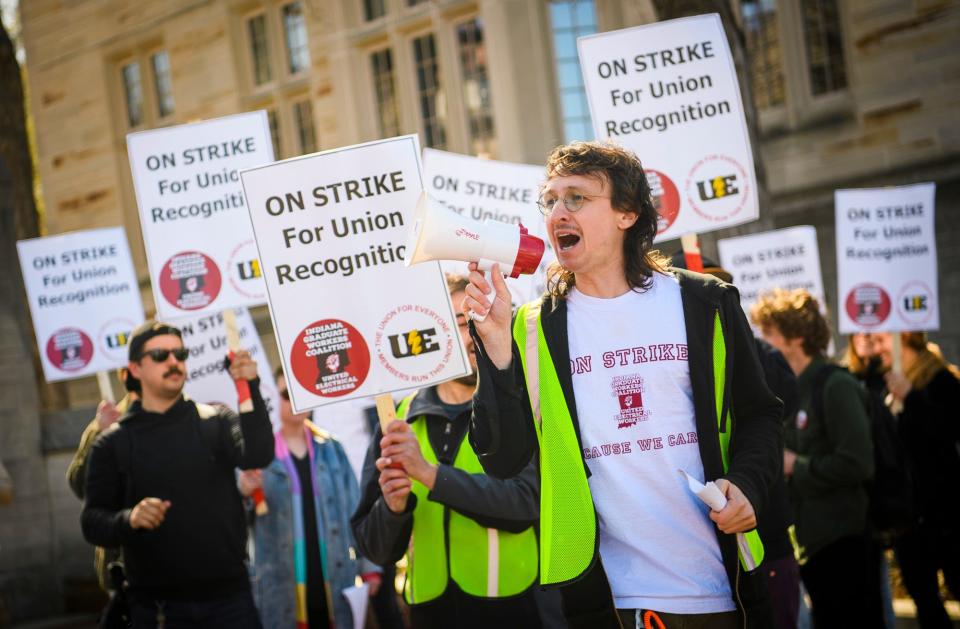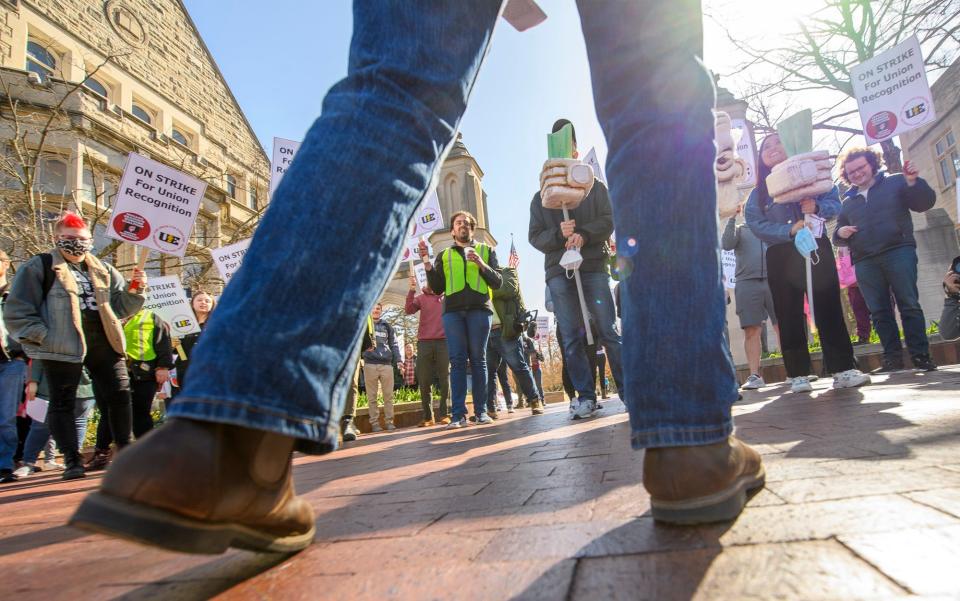IU graduate workers continue strike, faculty float vote of no confidence in provost
Editor's note: This story has been updated to clarify the total number of graduate students at IU.
As the graduate worker strike at Indiana University extends into finals week, some faculty members and students plan to take bold measures against the administration to show their solidarity.
On Tuesday, graduate students who are part of the Indiana Graduate Workers Coalition voted to extend the graduate student workers' strike through May 3. The extension was supported by 867 votes, a 95.7% majority.
Since the strike's beginning on April 13, graduate workers have been requesting union recognition from IU and an outlined process on how to discuss benefits, higher wages and fee reduction with administrators.

Around this time of year, graduate workers such as Cole Nelson would typically be heading into one of their busiest weeks of the semester. Nelson, who works as an instructor of record within IU Media School, noted that finals week is especially hectic for graduate workers. Between fielding questions and last-minute requests for make-up work from undergraduate students, many are also tasked with proctoring final exams.
"That's a lot of work for graduate workers, and we are happy and proud to conduct that work, especially under circumstances that are favorable," Nelson, who also serves as the media contact for the Indiana Graduate Workers Coalition, told The Herald-Times. "Unfortunately, these circumstances are not favorable."
The Indiana Graduate Workers Coalition, which includes about 1,750 IU graduate workers, submitted United Electrical Workers union cards for more than 1,500 graduate workers at IU-Bloomington in December, demanding IU hold a union election.
Indiana University's Bloomington campus has about 10,000 graduate students, of which about 2,500 are student academic appointees.
IU leaders rejected the demand, saying the graduate students aren't staff employees because their work is entwined with their education.
Previous: IU graduate workers submit cards, seek union election
In response to the strike, Provost Rahul Shrivastav has announced a task force focused on crafting the "ideal graduate experience" and the reinstatement of the Student Academic Appointee (graduate student worker) Committee of the Bloomington Faculty Council. Shrivastav has also previously committed to a 5% stipend increase for all SAAs and a new campus-wide minimum stipend rate of $18,000, in addition to more flexibility in using tuition waivers. None of Shrivastav's actions have received support from IGWC.
More: IU plan for grad education task force doesn't impress student leaders; strike to continue
With the strike now continuing at least into early next week, IGWC hopes it will have a "disrupting impact" on the university, compelling administrators to meet with the union for the first time.
IU Spokesman Chuck Carney said the labor strike has had "minimal disruption" with a small number of classes scattered across the various colleges being impacted.
"Each school has come up with contingency plans to help fulfill the end of classes so they wouldn't impact the undergraduates in such a heavy manner. The schools have implemented that where they needed to, but again, fortunately, it's been very few and far between at this point," Carney said.
As finals week fast approaches, the tight grading period hangs heavy on the minds of many faculty members.
IU faculty to host emergency meeting, discuss no confidence vote in provost
Gathered in the Whittenberger Auditorium, faculty members began Tuesday's town hall by sharing concerns about how, without the assistance of graduate workers, grades will be submitted within four days after the end of the term, as mandated in IU's policy. By the end of the assembly, a legal pad with a hastily written petition had garnered well over 50 signatures, signaling an emergency Bloomington Faculty Council meeting to consider — among other items — a call for a vote of no confidence in Shrivastav as provost.
"Many of us are feeling that we're reaching a point of crisis here," said Margaret Graves, associate professor of art history and co-chair of the Graduate Faculty Council. The town hall was sponsored by the Graduate Faculty Council and the IU-Bloomington chapter of the American Association of University Professors.

At the two-hour assembly, faculty members brought up various points of concern. For example, some members wondered how the administration's response to the strike, such as the threat of possible termination of graduate workers' appointments, could impact student recruitment, potentially placing IU's reputation as a research one university at risk.
"I think we have another problem arising, which isn't graduate students being fired, but graduate students being forced onto a labor market where they can make enough money to survive," said Elizabeth Cullen Dunn, geography professor.
Just that morning, Dunn said one of her graduate students turned down a SAA appointment for the fall semester because their landlord had raised their rent. Dunn noted this is happening "across the board" as living expenses such as housing rise.
"The issue isn't whether they will be fired or go back to work. The issue is whether they will go back to work as SAAs or whether they will leave to pursue full-time work outside the academy," Dunn said.
The conversation soon shifted to how the faculty can show solidarity toward graduate student workers.
Strongly worded letters and faculty refusal to submit grades were floated as options. However, other suggestions picked up enough steam to be written as a formal petition on the spot.
Under section 4.3 of the Bloomington Faculty Constitution, special meetings of the faculty can be convened by petition to the Bloomington Faculty president of 50 faculty members.
Because the faculty members' recent petition received over 50 signatures, the Bloomington Faculty Council will consider four items: extension of the grading period, union recognition for IGWC by the BFC, discussion of whether Shrivastav can or should be able to remove SAAs from their positions, and discussion of a vote of no confidence in Shrivastav.
According to the faculty constitution, 200 or more faculty members must be in attendance to form a quorum. At least 800 faculty members must vote in favor for a resolution to go through.
Details of the Bloomington Faculty Council's emergency meeting, such as date and time, will be soon determined.
IU Graduate and Professional Student to host no confidence vote
At the beginning of the faculty town hall, Valentina Luketa, a representative of Indiana Graduate Workers Coalition and the president of the Graduate and Professional Student Government, spoke about some personal disillusionment with the IU administration.
Last weekend, Luketa said GPSG met with Shrivastav's chief of staff for the first time to discuss how the administration can mend the relationship with graduate student workers. Carney said GPSG has met with vice provost David Daleke biweekly for the past several months about this issue.
According to Luketa, she and other GPSG members worked on a basic framework for potential solutions. This was given to Shrivastav's office with GPSG members hopeful this was the first step in a long dialogue.
A few days later, on Monday, Luketa said she was shocked at the recent email that had just been delivered to graduate students.
"Following input from GPSG, the Bloomington Faculty Council Executive Committee and I also endorse the reinstatement of the SAA Committee of the Bloomington Faculty Council," Shrivastav wrote in the email. "This committee is important to ensure that matters of concern to our SAAs are discussed within the BFC on a more regular basis, and that SAAs have the ability to engage directly in institutional priorities and shared governance."
According to Luketa, this announcement misrepresented GPSG's involvement in the process. The SAA Committee's reinstatement was not discussed in that meeting at all, Luketa said.
"We just simply can't believe the provost anymore, and we find that he disrespected the democratic body of GPSG," Luketa said.
The Graduate and Professional Student Government will host an emergency assembly at 6 p.m. Wednesday at Psychology Lecture Hall 100. At the meeting, graduate representatives will host a vote of no confidence for the current IU administration, mainly Shrivastav, as well as a motion for graduate representatives to withdraw from shared governance bodies across campus.
Carney declined to comment on GPSG's impending vote and said administrators are interested in continuing to speak with graduate students.
"We are committed to continuing the dialogue and continuing to work on the actual issues. We have settled the union issue, but as far as talking about what we need to do to help improve conditions, that's what we are committed to continuing to talk about," Carney said.
Contact Rachel Smith at rksmith@heraldt.com or @RachelSmithNews on Twitter.
This article originally appeared on The Herald-Times: Indiana University provost gets heat from student faculty over strike
